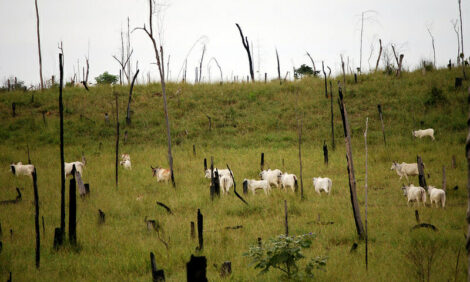



Which Way Will The Genetic Market Go?
UK - Beef farmers with 20-30 years of running a challenging business in front of them need to be sensitive to changes in the direction the beef industry is taking, says The National Beef Association (NBA).Much of the current focus at farm level is on the adoption of new genetic markers which can, for example, help businesses develop a more durable, and more cost efficient, pool of breeding stock or produce calves that are more likely to deliver beef that has a better chance of being tender when it hits the kitchen plate.
But, warns NBA director Kim Haywood, retailers whose commercial operations already demand huge, daily deliveries from dedicated processors are much more interested in solving the persistent problem of inconsistent eating quality.
And this could soon result in the establishment of a handful of large, retail led, supply pools in which most farmers ally themselves, through a contract, with a single processor and work with them to supply exactly the type of beef that their selected outlet demands.
“New markers for genetic beef value are exciting - and forward thinking farmers are already working out the best way to use them,” explained Ms Haywood.
“However one of the messages emerging from the retail sector is that uncoordinated adoption on thousands of individual farms could make the production of consistent quality beef even more confusing than it is at present – so each of the biggest supermarkets may soon be asking large sections of the industry to work with it on a well thought out, whole chain, master plan.
“This could mean that the most successful beef farmers in 2020 and beyond will be those who have hitched their business to a single retail outlet and contract with it to deliver meticulously specified cattle which fit exactly into the breed, regional origin, high welfare, and consistent eating quality template that retailers have noticed consumers are already demanding.
“Other retail considerations are green issues like the reduction of food miles, and smarter use of fuel and energy, but farm systems that can breed and feed cattle with predictable high eating quality are the real Holy Grail.”
According to the NBA either the industry itself, or individual retailers, will soon be creating test populations of cattle with specific gene marker input - and these will be closely examined to see exactly what they produce.
“It will be important, from the consistent tenderness perspective, to see whether or not some EBVs produce new problems elsewhere and then for the industry to decide exactly what it wants,” said Ms Haywood.
“Breed based programmes developed by Waitrose have been a huge success and just this week Asda’s ethical and sustainable sourcing specialist confirmed the launch of a Wagyu based project aimed at delivering high quality beef which is capable of earning more money for everyone involved in its supply.
“This could be the way the industry will move in future and younger farmers in particular need to be ready to adapt.”
TheCattleSite News Desk


